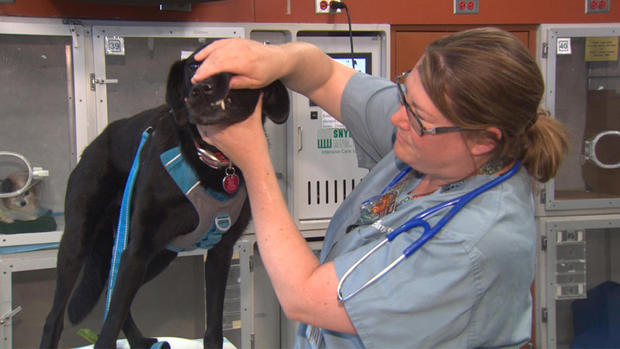First Case Of Dog Flu Confirmed In Massachusetts
BOSTON (CBS) - Dog owners are being urged to vaccinate their pets as the first case of canine flu this year has been confirmed in Massachusetts.
A six-month-old poodle was treated and released on Aug. 14 after a two-day stay at the MSPCA's Angell Animal Medical Center.
The MSPCA is urging owners of at-risk dogs to consider vaccinating their pets against the highly contagious virus for added protection. Veterinarians estimate that the the vaccine is about 60 percent effective.
"We cannot confirm that this case was 'patient zero' in Massachusetts, but we do know that this dog had not traveled to states that have recently experienced outbreaks of flu," said Dr. Virginia Sinnott of Angell's Emergency & Critical Care Unit. "We must therefore recommend dog owners take preventative measures to reduce their pet's chances of contracting the virus."
The poodle that ultimately tested positive arrived at Angell on Aug. 12 with a high fever and cough. The veterinary team suspected canine flu. The dog was treated in isolation and the hospital's infection control plan was activated.
"Even as we treated the patient with fluids and antibiotics we ensured that every surface in our critical care unit was disinfected to prevent the spread of the virus," said Sinnott, who underscored that the flu virus is extremely easy to kill so long as surfaces are cleaned before any other dogs can touch them.
No other dogs at Angell during the time the infected patient was treated have come down with flu. But since the poodle was admitted, two other dogs have arrived at the hospital with flu-like symptoms.
"We should know whether those dogs are flu-positive by early next week," said Sinnott.
There was too little virus detected to confirm the exact strain that the poodle had contracted.
"H3N2 is the strain that everyone worries about because it's in the news a lot," said Sinnott. "We must keep in mind that, for most dogs, flu - even H3N2 - is just a nuisance. They'll feel crummy for a couple days and cough quite a bit, but it is generally not fatal."
Flu outbreaks raise alarms in the veterinary community because the virus is extremely contagious. Dogs are able to spread the virus to other dogs several weeks before and after they get sick. In older dogs or those with existing respiratory issues, flu can lead to pneumonia.
Since March 2015, when the more contagious H3N2 strain was spotted in the U.S., veterinarians have treated dogs in nearly every state, which now includes Massachusetts.
If traveling with dogs to any state that has experienced an outbreak, steer clear of all dog parks, veterinary hospitals (except for emergency treatment) or other areas where dogs congregate. Follow Cornell University College of Veterinary Medicine's site with canine flu updates on positive tests around the country.
Sinnott recommends that dogs experiencing coughing, runny nose, fatigue, labored breathing or lack of appetite be immediately evaluated by their veterinarian. Inform veterinary staff if you suspect canine flu, and stay away from all other dogs in the waiting area.
Canine flu is not fatal in most cases, nor does it pose a threat to humans, cats or other pets. But the odds of dogs contracting the illness after exposure are nearly 100 percent. Dogs can be sick for an average of 10 to 20 days.




